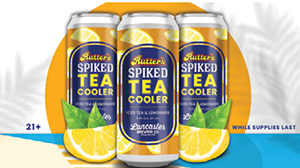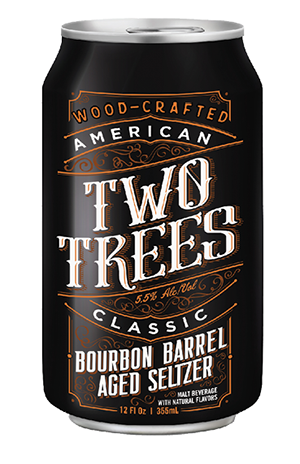 Rutter's partnered with Lancaster Brewing Co. on a limited-time-offer spiked tea cooler brewed using the same ingredients as its original tea and lemonade combination and has an ABV of 5.5%.
Rutter's partnered with Lancaster Brewing Co. on a limited-time-offer spiked tea cooler brewed using the same ingredients as its original tea and lemonade combination and has an ABV of 5.5%.
With overall sales of traditional packaged beverages languishing in recent years, it’s no wonder marketers have set their sights on other expanding and profitable categories. And while it’s still too early to know if these moves into new segments will be successful, they’re certainly garnering a lot of attention from beverage industry members and retailers, as well as projections as to how the developments will affect the beverage business going forward.
“It’s a blur,” said Don Rhoads, president of The Convenience Group chain of stores in the Pacific Northwest, of recent partnerships between soft drink companies and alcoholic beverage marketers on new age-restricted drinks. “Everyone wants into that space; it provides an opportunity.” Changing consumer interests are also factoring into the partnerships, Rhoads said. Thanks to the pandemic and resulting product supply outages, consumers are open to new options more than ever.
Topo Chico hard seltzer, the spiked version of the popular Coca-Cola–owned mineral water, was introduced in 2021 and rolled out nationally earlier this year. It’s produced, distributed and marketed by Molson Coors Beverage Co. via a brand authorization agreement. According to the Chicago-based brewer, the hard seltzer has been an early success. Perhaps that’s why the two companies expanded their partnership this year. Simply Spiked lemonade, an alcoholic version of the top-selling juice brand, launched during the summer. “We’re putting our strengths together in a way that’s collaborative and set up for success,” Jamie Wideman, vice president of innovation for Molson Coors, said of the expanded partnership.
Rutter’s, based in York, Pennsylvania, this spring partnered with Lancaster Brewing Co. on a limited-time-offer spiked tea cooler, inspired by Rutter’s Tea Cooler, made by Rutter’s Dairy.
Rolled out in May, the spiked version is brewed using the same ingredients as the original tea and lemonade combination and has an ABV of 5.5%.
“We’re thrilled to continue our partnership with Lancaster Brewing Co. by launching our second private-label beer product, Rutter’s Spiked Tea Cooler,” said Sean Pfeiff, Rutter’s senior category manager. “The great customer response and enthusiasm we saw from our Chocolate Milk Stout, released for a limited time in November 2021, made the decision to work together again a no-brainer.”
Coca-Cola recently teamed up with another beverage alcohol supplier to leverage yet another brand in the growing ready-to-drink cocktail segment. Under the agreement, Constellation Brands—a beer, wine and liquor supplier—will produce, distribute and market Fresca Mixed, with the launch expected this year. Fresca Mixed is the brainchild of Coca-Cola’s New Revenue Streams group, which, the company said, “supports Coke’s journey to become a total beverage company with drink options for all occasions and need states.”
According to Dan White, chief of the business unit, “third-party relationships with licensed alcohol manufacturers show how we’re following the consumer, taking an agile, experimentative approach to expanding our brands’ reach based on the evolving landscape.”
 Two Trees Beverage Co. introduced Bourbon Barrel Aged Seltzer, a malt-based, wood-crafted seltzer, this spring.
Two Trees Beverage Co. introduced Bourbon Barrel Aged Seltzer, a malt-based, wood-crafted seltzer, this spring.
GAME CHANGER
PepsiCo is collaborating with a leading beverage alcohol supplier to expand one of its carbonated soft drinks into the age-restricted space, but it’s this partnership that has sparked concern among licensed drinks industry members. Under an agreement with Boston Beer Co., HARD Mtn Dew launched earlier this year in Florida, Iowa and Tennessee, and additional markets are on tap. While the producer of Samuel Adams Boston Lager and Truly hard seltzer is manufacturing the new flavored malt beverage, PepsiCo has the responsibility to sell, distribute and market it. Depending on state and local regulations, the new product will be distributed via Pepsi’s existing beverage trucks, independent beer wholesalers or the company’s fledgling Blue Cloud beverage alcohol distribution arm.
Speaking to beverage analysts earlier this year, PepsiCo CEO Ramon Laguarta called the move into age-restricted drinks “strategically very incremental, sizable and profitable.” He added that other PepsiCo brands could also be extended into the space.
Some beer industry members and observers, however, are skeptical of PepsiCo’s entry into the beer distribution tier. “It simply clutters the landscape of an already-crowded field,” remarked Bump Williams, president and CEO of Bump Williams Consulting, which works as an adviser for the alcoholic beverage industry. “We already have an [alcoholic distribution] system that works very well.” Williams questions how soft drink distributors will transition to distributing alcoholic beverages. “It will take soft drink distributors a long time to secure a new facing and obtain additional shelf space,” he noted. HARD Mtn Dew isn’t the first expansion of the popular CSD brand. Mtn Dew Energy is a recent entry into the energy drink segment.
In another collaboration, Boston Beer has partnered with Beam Suntory to expand some of both companies’ respective brands into other categories. Malt-based Sauza Agave cocktails (produced by Boston Beer) and Truly vodka and Twisted Tea Sweet Tea whiskey (produced by Beam Suntory) launched earlier this year, and according to the two companies, more products are planned. While still early in the process, “in the convenience channel, multiple retailers are making Truly vodka their big spirit bet for 2022,” said Heather Boyd, managing director—U.S. RTDs, at Beam Suntory. “These retailers are excited to see the trial from Truly hard seltzer drinkers and see huge opportunities for cross-merchandising.”
For Sauza Agave FMB cocktails, meanwhile, among the lead packages for c-stores is the 24-ounce can of the Lime Crush flavor, according to Lesya Lysyj, chief marketing officer at Boston Beer.
There’s a very high overlap of craft sour shoppers and hard seltzer shoppers."
CONSUMER-DRIVEN TREND
While beverage marketers see growth and profitability opportunity by expanding into new drink categories, the trend is also consumer driven. Rob Hertenstein, innovation director at FIFCO USA, said, “One thing driving it is the consumer’s appetite to try new or novel things. While there used to be quite a high barrier to trial, that has gone away, and today consumers crave new and different.” As a result, he said, “Brands are being given permission by consumers to stretch into adjacent categories.”
Indeed, Boyd remarked that Truly hard seltzer drinkers are “active purchasers of vodka, so entering into the vodka space is an opportunity to introduce Truly flavors to a new category and bring the brand into new occasions.” For c-stores, the new products are helping retailers expand product assortment while increasing foot traffic and basket size, Williams noted.
Beyond company collaborations, beverage blurring is playing out in other ways. Monster Beverage Corp. recently purchased the Canarchy Craft Brewery Collective, parent to craft breweries including Oskar Blues Brewery and Cigar City Brewing. Upon announcing the deal, Monster Vice Chairman and Co-CEO Hilton Schlosberg said it “provides us with a springboard from which to enter the alcoholic beverage sector,” including a “fully in-place infrastructure, people, distribution, licenses and alcoholic beverage development expertise and manufacturing capabilities.” Indeed, in August, Monster announced the introduction of The Beast Unleashed, a flavored malt beverage packaged in 16-ounce single cans and variety packs.
Breweries are also blurring the lines between product categories with new offerings. Anheuser-Busch, for example, recently extended the Bud Light hard seltzer brand with Bud Light seltzer hard soda in four flavors. FIFCO, meanwhile, has expanded its Labatt Blue Light hard seltzer brand with a sour beer style variant. According to Hertenstein, Labatt Blue Light Seltzer Tart was introduced in response to consumer interest in bold flavor profiles, as well as growing demand for sour beers. “There’s a very high overlap of craft sour shoppers and hard seltzer shoppers,” the beer executive explained.
Brands are being given permission by consumers to stretch into adjacent categories."
EMBRACING THE OPPORTUNITY
If consumers are on an insatiable quest for new products, it’s important for retailers, including c-store operators, to have those products available, suppliers said. “We’re seeing consumers shopping agnostically across categories, looking for brands they know and love,” said Beam Suntory’s Boyd. “This presents a key opportunity to extend beloved brands into new expressions, formats and outlets and drive additional brand affinity and customer loyalty.” For c-stores, she added, continued innovation allows operators to offer “consumer-centric products and leverage strong brand affinity to drive purchases.” Some retailers are excited about the prospects.
“As big players like Coke and Pepsi enter the age-restricted space, I hope the marketing dollars will follow,” said Colin Dornish, senior director of operations at Coen Markets, a c-store chain based in the Mid-Atlantic.
Additional products and players in beverage alcohol will also bring some challenges for c-stores. Williams pointed to “more trucks in the parking lot of already-crowded stores and additional people calling on store and district managers.”
Rhoads foresees continued stress on shelf space. “With the arrival of new products that cross categories, we have to ask, ‘Where does this product belong?’” he said. “If it’s a new category, we’ll have to carve out new space.” Moreover, the new products will likely cannibalize existing offerings, he added. “While these new products can be a big opportunity, they can also be a big challenge from a category-management standpoint,” Rhoads noted.
Challenges aside, blurring of beverages is expected to continue, according to suppliers and retailers. “We’re expecting an explosion,” said Rhoads. “Because they’re grab-and-go products, they’ll result in additional trips to c-stores. We’re all about trips, so we’re in.”